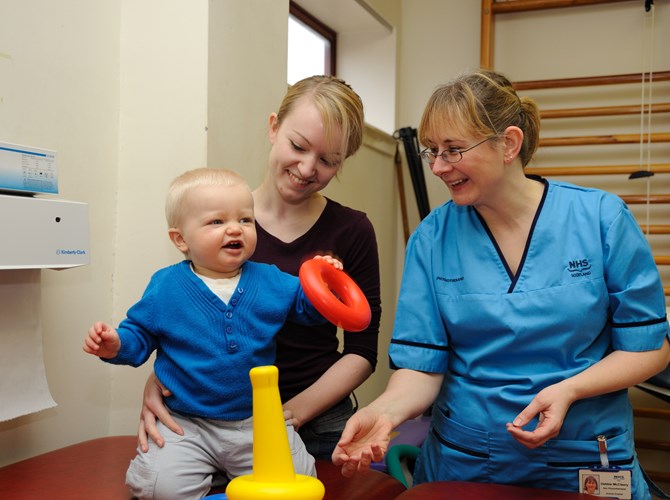Previous
Paramedic
You'll need an undergraduate degree to become a physiotherapist. You'll then be ready to register with the Health and Care Professions Council (HCPC) and work in the NHS.
Physiotherapists help people affected by injury, illness, or disability through movement and exercise, manual therapy, education, and advice.
They maintain health for people of all ages, helping patients to manage pain and prevent disease.

To get on a course that could lead to a career as a physiotherapist, useful subjects include:
Speak to your guidance teacher about subjects offered at your school.

You may find it helpful to get some healthcare experience by doing a work placement or volunteering. You’ll get training, increase your knowledge, and learn new skills. This could help you when applying to university, college or a new job with NHSScotland.
Most universities accept a wide range of qualifications, giving you the option of applying directly from school or going to college first.
At college, you could do an HND in Sports Therapy or Applied Sport Science.
Widening participation supports adult learners who want to go to university. If you’re an adult with few or no qualifications, you could get into higher education through the Scottish Wider Access Programme (SWAP). Many universities also provide access programmes to help you get the degree entry qualifications you need.
In Scotland, 3 universities offer undergraduate programmes in Physiotherapy approved by the HCPC:
Pre-registration undergraduate programmes take 4 years full-time.
If you have relevant qualifications and healthcare experience, you can do a master’s degree in Physiotherapy. A postgraduate pre-registration course usually takes 2 years.
You should contact individual universities to find out about specific entry requirements.
After graduation, you must register with the HCPC. You can then apply as a newly qualified physiotherapist for vacancies in the NHS.
Functional movement is a key part of what it means to be healthy.
As a physiotherapist, you'll care for people who have many different types of conditions, such as:
Physiotherapy plays a significant role in enabling people to improve their health, wellbeing, and quality of life.
Tasks include:
You could use a range of equipment such as:
You'll need these skills:
Physiotherapists work with other healthcare professionals, including:
You could work in:

Check out our 360 videos to learn how physiotherapists use movement and exercise to improve a person's ability to be active and positively impact their quality of life.
You'll meet Connor, a musculoskeletal physiotherapist at NHS Grampian. He explains how physiotherapists treat patients with respiratory problems or orthopaedic injuries and conditions.
Connor says, "The most rewarding part of being a physiotherapist is seeing the improvements I make to people's lives."
During your career, you’ll be expected to keep your skills and knowledge up to date through Continuing Professional Development (CPD). The Chartered Society of Physiotherapy (CSP) provides:
Visit the CSP website for more about training and CPD courses.
With training and experience, you may choose to specialise in a particular area of practice, such as:
You could also progress to advanced or consultant physiotherapist roles.
As head of a physiotherapy service, you would be responsible both for a team of staff and for managing a budget.
There are also teaching and research opportunities.
When you become a qualified art therapist, you must register with the HCPC to work in the NHS. You can also join the Chartered Society of Physiotherapy.

Discover the range of AHP careers you can choose in the NHS.
Allied health professions
Our blog includes how-to guides, case studies, and career resources.
Discover more